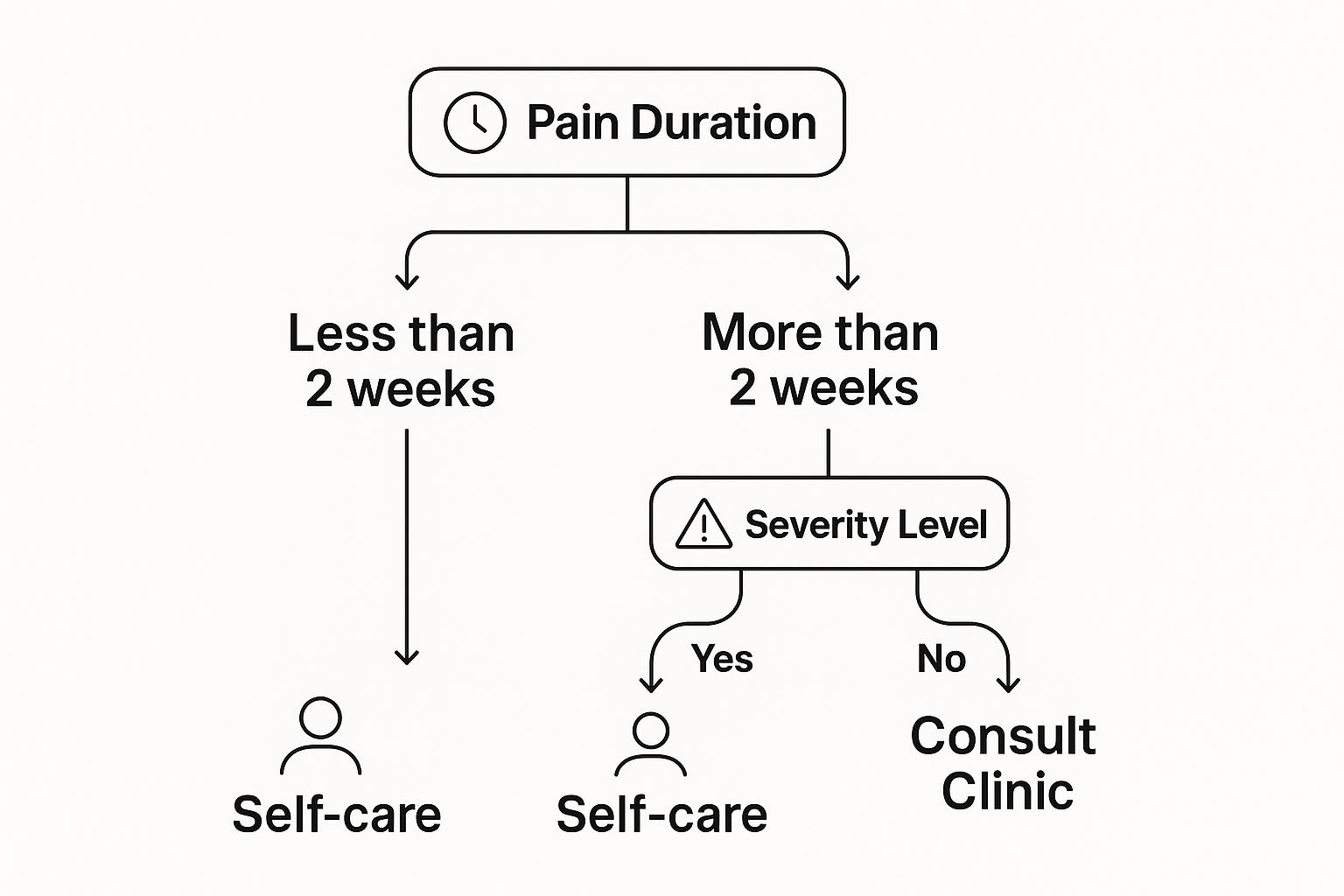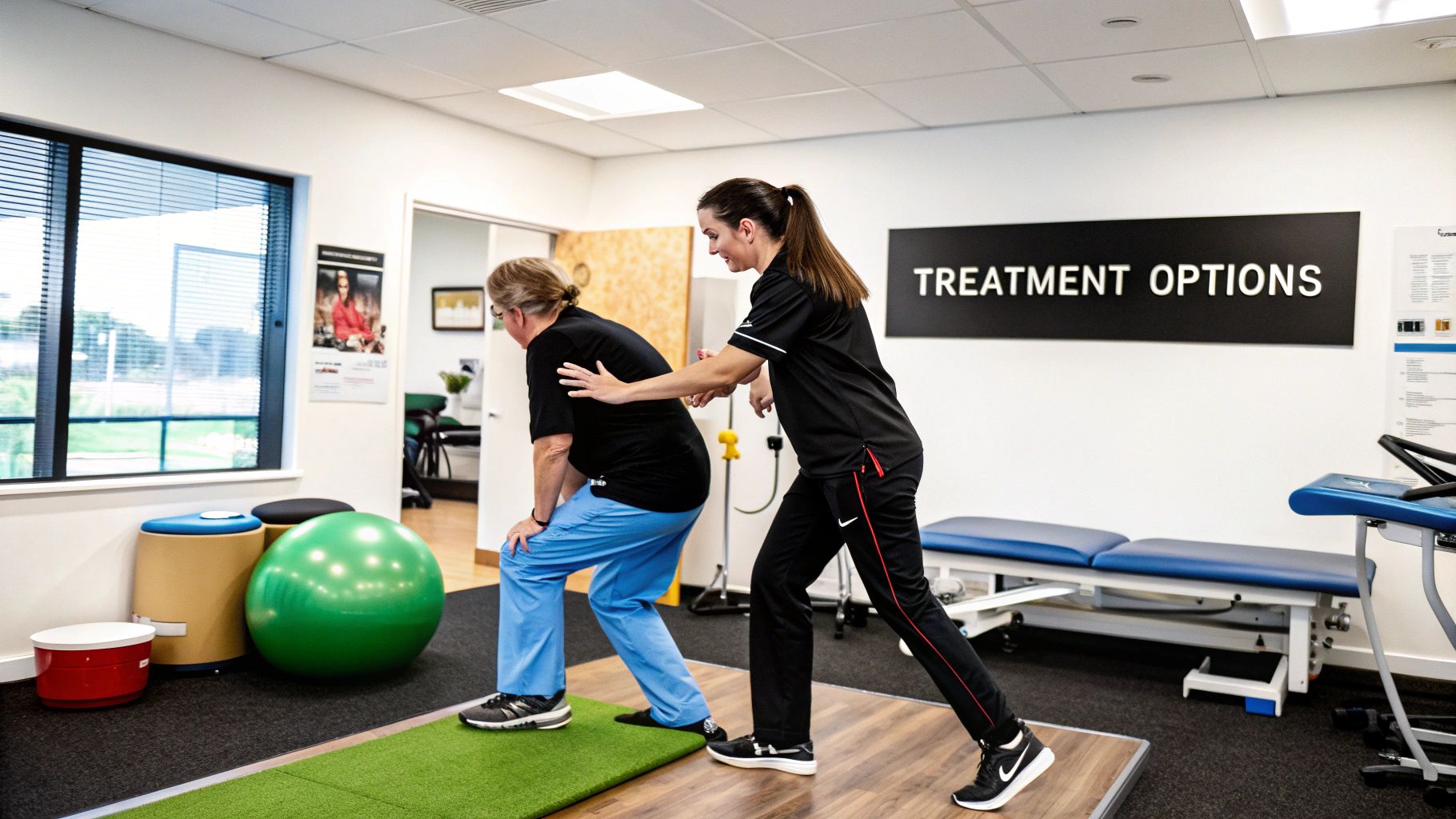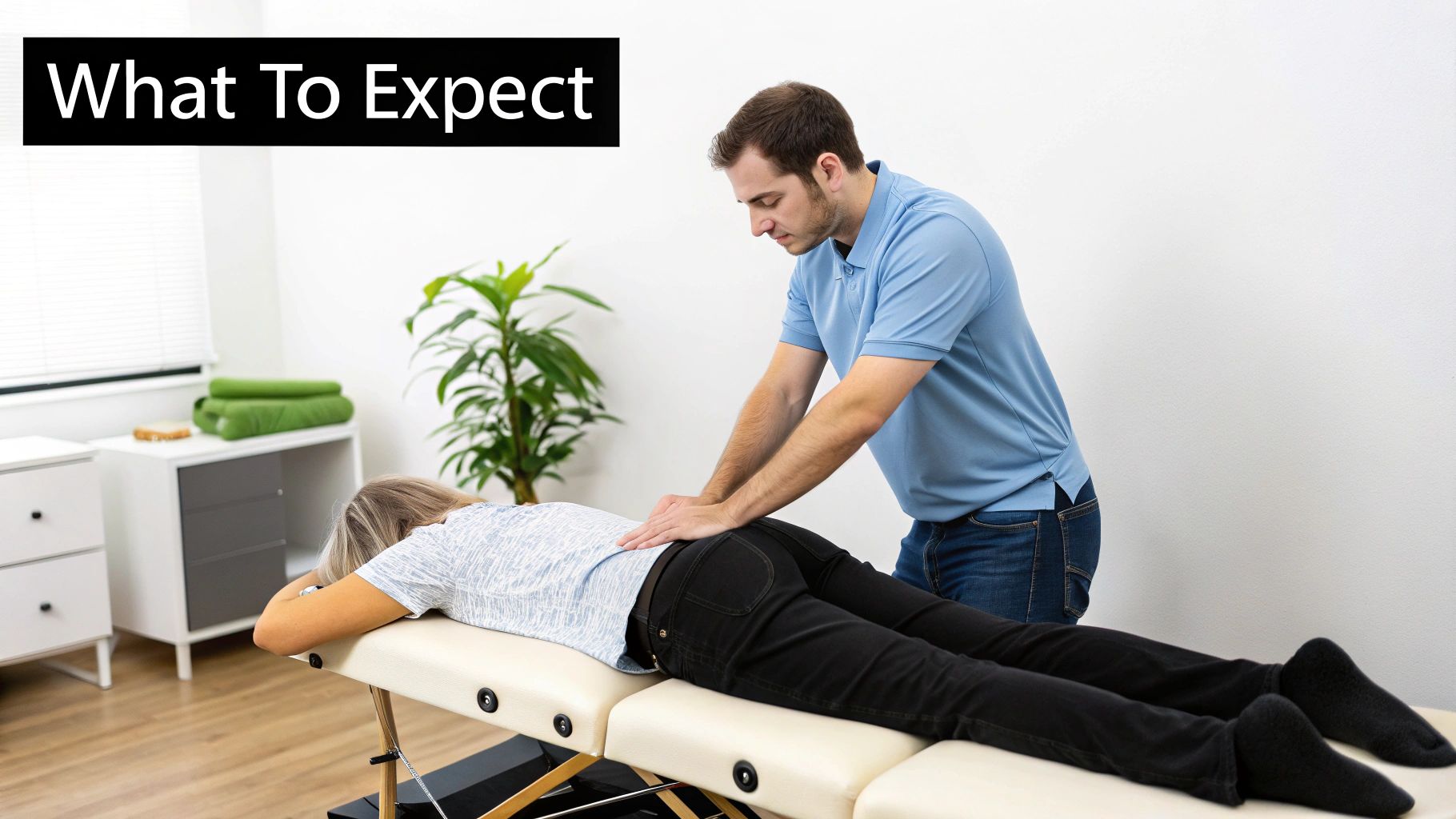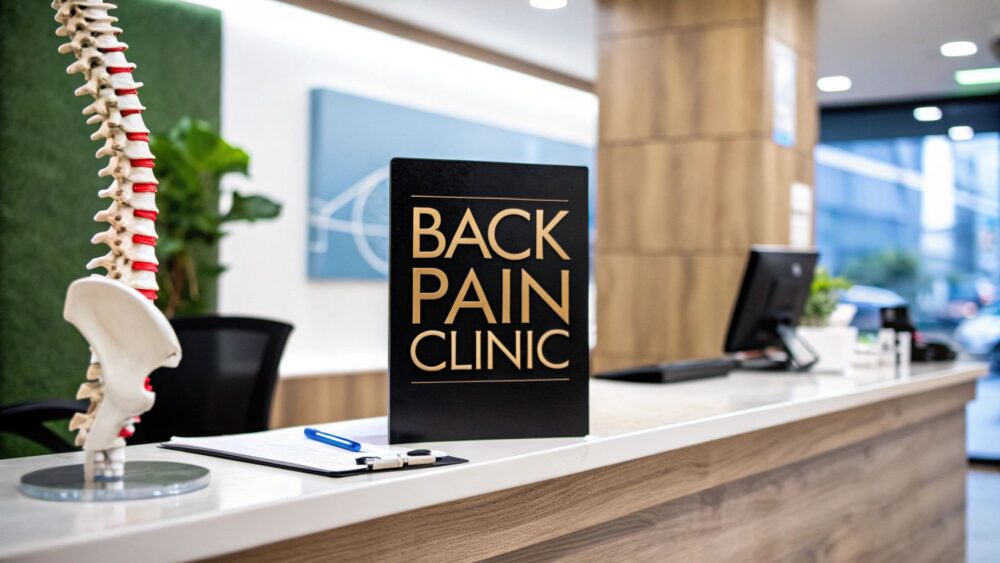When you're dealing with persistent back pain, that first search for a "back pain clinic near me" feels like a huge step. It’s not just about finding a place on a map; it’s about finding the right people to help you get your life back.
Your First Steps to Finding a Local Back Pain Clinic

With so many options out there, it’s easy to feel a bit lost. In the UK, the most common starting point is a chat with your GP. They can do an initial check, offer a preliminary diagnosis, and give you an official referral. This makes sure you end up with the right kind of specialist for your specific problem.
Going to your GP isn't just a formality—it helps build a clear picture of what’s going on. Back pain is incredibly common here in the UK, with around 80% of us experiencing it at some point. The good news? Less than 1% of cases are caused by a serious underlying disease, and most flare-ups get better on their own within a few months. The NHS has some great insights into low back pain statistics if you want to dig deeper.
Getting Clear on Your Situation First
Before you even start looking at clinic websites or reading reviews, take a moment to think about your own needs. A little self-assessment goes a long way in making your search more focused and successful. The goal is to match a clinic's expertise with your personal health challenge.
Ask yourself a few key questions:
- What does the pain feel like? Is it a sharp, sudden pain from a new injury? Or is it a dull, chronic ache that’s been hanging around for months, or even years?
- What do you want to achieve? Are you after immediate relief from a flare-up, a long-term plan to manage the pain, or strategies to stop it from coming back?
- What have you tried before? Think about past treatments. What worked for you? More importantly, what didn't?
Knowing the answers helps you explain your situation clearly to any potential clinic. For instance, someone with a recent sports injury needs something very different from a person managing degenerative disc disease. Getting this clarity is vital, especially when you start looking for a back pain specialist near you.
Your search isn't for just any clinic—it’s for a team that gets the specifics of your condition and can lay out a clear, personalised recovery plan.
To give you a head start, here’s a quick rundown of what to look for when you start evaluating clinics.
Key Attributes of a High-Quality Back Pain Clinic
This table summarises the essential factors to evaluate when considering different back pain clinics in your area.
| Attribute | What to Look For | Why It Matters |
|---|---|---|
| Specialised Expertise | Practitioners with specific training and qualifications in spinal health, such as osteopaths, or physiotherapists. | A specialist understands the complexities of back pain far better than a generalist and can offer more targeted treatments. |
| Comprehensive Diagnostics | Use of advanced diagnostic tools (e.g., digital X-rays, posture analysis) to get to the root cause of your pain. | A precise diagnosis is the foundation of an effective treatment plan. Without it, you're just treating symptoms. |
| Personalised Treatment Plans | The clinic should create a unique plan based on your diagnosis, goals, and lifestyle, not a "one-size-fits-all" approach. | Your body and your pain are unique. Your recovery plan should be, too. |
| Patient Testimonials | Genuine reviews and testimonials from past patients, ideally with details about their specific conditions and outcomes. | Real-world feedback gives you confidence in the clinic’s ability to deliver results and shows their track record. |
| Clear Communication | The team should explain your condition and treatment options in a way you can easily understand, without medical jargon. | You should feel like an active partner in your recovery, not just a passive patient. |
Having these points in mind will help you sift through the options and identify clinics that are truly equipped to help.
Laying the Groundwork for a Confident Choice
The best way to move from feeling uncertain to taking confident, proactive steps is to arm yourself with knowledge. As we go on, we’ll dive into the different types of treatments you might encounter, from hands-on physical rehabilitation to more advanced pain management techniques.
We’ll also cover how to check a clinic’s credentials properly and, crucially, what questions you need to ask during that first consultation. The aim here is to give you a solid framework for making an informed choice, so you can find a clinic that not only aligns with your health goals but also provides a genuinely supportive environment for your recovery.
Decoding Different Approaches to Back Pain Treatment
Not all back pain is created equal, and neither are the clinics that treat it. Once you start searching for a "back pain clinic near me," you'll quickly find a whole spectrum of treatment styles. Getting your head around these differences is the key to finding the right fit for your specific problem.
Some clinics are all about physical rehabilitation. Their entire focus is on getting you moving again, building up your strength, and improving flexibility with targeted exercises and hands-on therapy. This is often a brilliant path for acute injuries or for getting back on your feet after an operation.
On the other hand, you'll find clinics that specialise in more advanced pain management. These centres are geared up to handle persistent, complex pain, often using medical procedures to bring relief when other methods haven't quite hit the mark. The right choice really does depend on the story your pain is telling.
Rehabilitation and Physiotherapy-Led Clinics
Clinics that put physiotherapy and rehabilitation front and centre are perfect for certain situations. Think of a weekend footballer who pulls a muscle in their lower back. Their goal is simple: recover quickly, get their strength back, and learn how to stop it from happening again.
A physio-led clinic would be the ideal place for them. The treatment would likely involve a mix of:
- Manual Therapy: Hands-on techniques to get joints and soft tissues moving properly again.
- Prescribed Exercises: A programme tailored specifically to them, designed to strengthen core muscles and fix their posture.
- Education: Solid advice on body mechanics to dodge future injuries.
It's a proactive and empowering approach, putting the tools for recovery right in your hands. It’s not just about fixing the immediate issue but building resilience for the long haul. For many people with mechanical back pain, this is the most direct route to lasting relief.
The whole point of rehabilitation isn't just to quieten the pain—it's to restore function. It’s about getting you back to living your life, whether that means playing sports, tending to the garden, or simply lifting your grandkids without a second thought.
Advanced and Multidisciplinary Pain Centres
Now, let's picture a different scenario. Someone has been living with degenerative disc disease for years. The pain is chronic, messing with their sleep, their work, and their quality of life. Basic exercises just aren't cutting it anymore. This is where a multidisciplinary or advanced pain management clinic comes into its own.
These centres offer a much broader range of treatments under one roof, often bringing a whole team of different specialists together. Their toolkit might include everything from physiotherapy to more advanced procedures designed to target the very source of the pain. The hard truth is that chronic low back pain is a massive health issue in the UK, affecting more than 5.5 million people. For a huge number of them, especially the one in six who suffer from vertebrogenic pain linked to vertebral endplate damage, fresh solutions are vital. Pioneering treatments now available in the UK really show the commitment to finding real answers for this debilitating condition. You can explore more about these new procedures for chronic low back pain and see how UK health services are rising to the challenge.
This integrated approach means that if one treatment doesn't work, the team can easily pivot to another without sending you off to start all over again somewhere else. It makes for a seamless and supportive journey for those with the most challenging back conditions.
Right, you've got your shortlist of potential clinics. Now for the important part: digging a little deeper to find the perfect fit for you.
This is where you graduate from simply searching "back pain clinic near me" to actively choosing a partner in your health. Taking the time to properly vet a clinic makes all the difference, ensuring the team you pick is not just qualified, but genuinely aligned with your recovery goals.
First Things First: Check Their Credentials
Your first port of call should always be the team's professional credentials. This isn't just a formality. In the UK, healthcare professionals are required to be registered with specific regulatory bodies. Think of this registration as a quality mark – it confirms they meet national standards for training, skills, and professional conduct.
You can usually find these details on the clinic's website, often tucked away on an "About Us" or "Our Team" page.
Here are the key professional bodies you should be looking for:
- General Medical Council (GMC): For all medical doctors, including any pain management consultants or surgeons on the team.
- Health and Care Professions Council (HCPC): This is the one for physiotherapists.
- General Osteopathic Council (GOsC): For any osteopaths at the practice.
If you can't spot this information easily, don't be shy. Just ask the clinic directly. Any reputable practice will be more than happy to share their team's qualifications.
This simple guide can also help you frame your next steps based on how long you've been in pain and how severe it is.

The key takeaway? While you can often manage mild, short-lived pain at home, persistent or severe pain is your body’s way of telling you it's time to get an expert involved.
Reading Between the Lines of Patient Reviews
Patient reviews and testimonials offer a fantastic glimpse into what it's really like to be treated at a clinic. But you need to look beyond the generic "they were great" comments.
The most telling feedback comes from people who describe their specific situation and the journey they went on with the clinic. Pay close attention to comments about communication, the clarity of the treatment plan, and how supported they felt. Did they feel listened to? Were they involved in their own care? These little details often reveal more about a clinic's culture than a simple star rating ever could.
A truly exceptional clinic doesn't just treat a bad back; they treat a person. Look for reviews that mention compassion, clear explanations, and a team that genuinely listens to what you need.
What to Ask at Your Initial Consultation
Your first appointment isn't just for them to assess you; it's a two-way interview. This is your chance to see if they're the right fit for you. Walking in with a few prepared questions is one of the best ways to take an active role in your healthcare right from the start.
Here are a few ideas to get you started:
- "What's your approach to finding the root cause of my kind of back pain?"
- "Could you walk me through a typical treatment plan for someone with my condition?"
- "What kind of success have you had with conditions similar to mine?"
- "How will we track my progress, and what's a realistic timeline for feeling better?"
The answers you get should feel clear, confident, and tailored to you. This single conversation will tell you so much, helping you make that final, informed decision and start your recovery with a team you can truly trust.
Navigating Costs and Private Insurance in the UK

Let's talk about the financial side of things. It’s a vital conversation to have when you’re planning your recovery, and understanding the costs involved with a private back pain clinic means you can move forward with confidence, free from any nasty surprises.
The reality in the UK is that over 22% of adults are living with chronic musculoskeletal pain, with back trouble leading the charge. When you look at the bigger picture, the lifetime cost of chronic back pain can spiral up to a staggering £3.9 million per person when you factor in treatment, lost income, and the impact on your career. It's no wonder so many people look to private medical insurance for quicker access to the care they need.
Making Sense of Private Medical Insurance
If you already have a private medical insurance policy, that’s a fantastic head start in your search for relief. But—and this is a big but—policies are not all created equal. They vary massively, so your first job is to get intimately familiar with your own plan.
Before you book a single appointment, you need to:
- Confirm Your Coverage: Dig out your policy documents or, even better, give your insurer a call. You need to know for sure that consultations and treatments for back pain are covered. Keep an eye out for any specific exclusions or limitations.
- Get Pre-Authorisation: This is non-negotiable for most insurers. They’ll need to give you the green light before you start treatment, usually by providing an authorisation code that the clinic will use for billing.
- Know Your Excess: Be crystal clear on your policy's excess. This is the amount you have to pay out of your own pocket before your insurance starts contributing.
Navigating the world of private healthcare can feel like a maze. To get a better grasp on how policies are structured, particularly for different life stages, looking into specific UK health insurance options for over 65s can be really enlightening. It shows just how tailored plans can be to meet different needs.
A simple 20-minute phone call to your insurer before your first visit can save you a world of stress later on. It just makes sure everyone is on the same page from day one.
What if You're Paying Yourself?
If you don't have private insurance, or if your policy won’t cover the treatment you need, you'll be what’s known as a 'self-funding' patient. Any reputable clinic will be completely transparent about their fees and should give you a clear cost breakdown right from the start.
Initial consultation fees vary across the UK, but most clinics will happily talk you through this over the phone. After your assessment, they’ll put together a proposed treatment plan that outlines the number of sessions they recommend and the total cost.
Many clinics also offer treatment packages or payment plans to make the investment more manageable. By exploring our resources on private healthcare, you can get a better feel for how self-funding works. Don't ever hesitate to ask the clinic about these options—their goal, after all, is to help you get the care you need.
Making Your First Appointment a Success
Your first consultation is more than just a meet-and-greet; it’s the cornerstone of your recovery. Walking in prepared can make a world of difference, turning what could be a stressful meeting into a productive partnership right from day one. Your specialist is there to help you, but the quality of their diagnosis often hinges on the quality of information you can give them.
A little bit of organisation beforehand goes a long way. When you arrive with the right documents to hand, the clinician gets a complete picture of your health history straight away. This saves a lot of time and helps them connect the dots between your past and your current pain.
What to Bring With You
Putting together a small file of essential documents is a simple but incredibly effective step. It means your specialist has all the context they need without any guesswork.
Here’s a quick checklist of what to bring:
- Your GP Referral Letter: If you were referred by your GP, this letter contains their initial thoughts and is vital for the specialist.
- Previous Imaging Results: If you’ve had any MRIs, X-rays, or CT scans for your back, bring the reports or the images themselves.
- A List of Your Medications: Make sure to include any prescriptions, over-the-counter painkillers, and even vitamins or supplements you take regularly.
- Details of Past Treatments: Jot down any other therapies you’ve tried for your back pain—physio, osteopathy, acupuncture—and whether they helped or not.
Arriving with these key documents means the specialist can spend less time on admin and more time on what actually matters: your symptoms and how to fix them. This simple act of preparation sets a collaborative tone from the very start.
How to Clearly Explain Your Symptoms
Paperwork aside, the most important information you can bring is a clear description of your pain. "My back hurts" is a starting point, but the more specific you are, the faster your specialist can zero in on the root cause. Vague descriptions can drag out the diagnostic process, whereas precise details are like valuable clues.
To help you get your thoughts in order, try keeping a simple 'symptom diary' for a few days before your appointment. It doesn’t need to be an essay; just a few notes can reveal important patterns. Think about answering these questions in your diary and then again during your consultation.
Key Questions to Answer About Your Pain
- When did it start? Was there a specific moment or injury, or did it just creep up on you?
- Where exactly is the pain? Is it in one spot? Does it shoot down your leg or into your buttocks?
- What does it feel like? Try to use descriptive words. Is it sharp, dull, aching, burning, or more of a tingling sensation?
- What makes it worse? Think about activities like sitting for a long time, standing, walking, or lifting things.
- What makes it better? Does lying down, stretching, or using a heat pack give you any relief?
- How does it impact your daily life? This is a big one. Explain how it affects your work, your sleep, your hobbies, or even just doing simple things around the house.
Coming prepared with this level of detail empowers your specialist. It allows them to make a much more accurate diagnosis and, ultimately, design an effective treatment plan that’s built specifically for you.
So, What's the Next Step on Your Journey to a Pain-Free Life?

Finding the right "back pain clinic near me" is really about taking back control. It’s about deciding that you've had enough and you're ready to find a real solution.
Hopefully, this guide has given you the confidence you need to get started—from knowing when to speak with your GP and understanding your options, to vetting clinics like a pro and knowing exactly what to expect at your first appointment. It’s a big step, but you’re not going into it blind.
The final, and most important, part of this process is now up to you. It's time to take what you've learned and book that initial consultation. Start the conversation with a specialist who can give you answers.
On top of getting professional guidance, remember that what you do at home matters, too. Learning about the best exercises for back pain can be a massive help in supporting your recovery and building long-term strength.
Your health is your greatest asset. Taking proactive steps and seeking expert advice is the most powerful investment you can make in your long-term wellbeing and quality of life.
Nothing beats sitting down with a specialist to discuss your unique situation. That conversation is the first concrete move towards lasting relief. Armed with new insights and a clear plan, you are in the best possible position to find the right partner for your health and finally begin your path to living pain-free.
Got Questions About Back Pain Clinics? We Have Answers
When you're dealing with back pain, figuring out the next steps can feel overwhelming. It's completely normal to have a lot of questions. Let’s clear up some of the most common ones we hear from people just starting their search for a "back pain clinic near me".
When Is It Time to See a Professional?
If your back pain is a minor niggle that clears up after a day or two of taking it easy, you might be fine without professional help.
However, you should definitely book a consultation if the pain sticks around for more than a few weeks, feels severe, or brings along other worrying symptoms. Things like numbness, tingling, or weakness in your legs are signals you shouldn't ignore. A good rule of thumb? Don't let a short-term problem turn into a long-term battle.
Do I Need a GP's Referral for a Private Clinic?
This is a big one. Here in the UK, you generally do not need a GP referral to see a specialist at a private clinic, particularly if you're paying for the treatment yourself. It gives you the freedom to choose who you want to see, when you want to see them.
The exception is if you plan to use private medical insurance. Your provider will almost certainly want a referral from your GP before they agree to cover the costs. Your first port of call should always be to check the specifics of your insurance policy.
Who's Who? Understanding the Different Specialists
The titles can get a bit confusing, but each specialist has a distinct role in getting you better.
- Physiotherapists: These experts focus on restoring movement and function. They use a combination of tailored exercises, hands-on manual therapy, and practical education to get you moving properly again.
- Osteopaths: An osteopath looks at how your entire body functions as a unit. They use physical manipulation, stretching, and massage techniques to improve your body's overall mechanics and relieve pain.
- Pain Management Consultants: These are medical doctors who specialise in diagnosing and treating complex or chronic pain. They often use more advanced procedures, like targeted injections, to manage persistent and severe pain conditions.
The right specialist for you really depends on your specific symptoms and what's causing the pain. Any good clinic will start with a thorough assessment to make sure you're seeing the right person for your needs.
A critical note: If your back pain suddenly becomes unbearable, especially after an accident, or if you lose control of your bladder or bowels, treat this as a medical emergency. Go straight to A&E or call 999 immediately.
At Spine, Body & Health, our team of specialists brings a combined 38 years of experience to the table, focusing on finding the true root cause of your back pain. If you’re ready to move towards a life with less pain, book your consultation with us today. Learn more and schedule your appointment.




